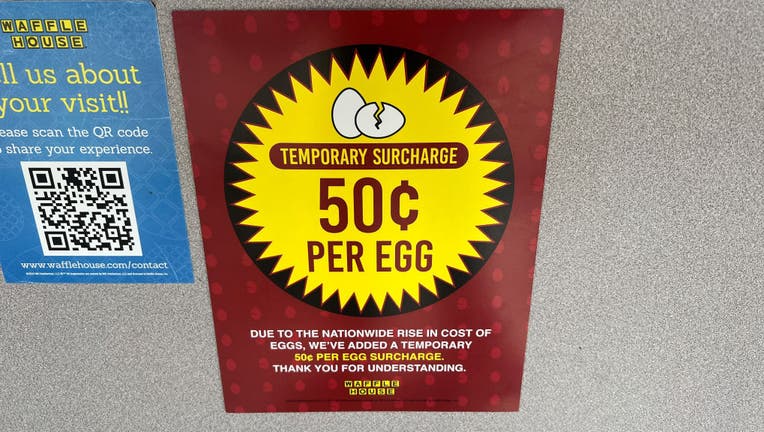Waffle House drops 50-cent egg surcharge as prices stabilize

A notice in a Waffle House restaurant advises customers of a 50 cent price hike per egg "due to the nationwide rise in cost of eggs," in Houston, Texas, on February 6, 2025. (Photo by GIANRIGO MARLETTA/AFP via Getty Images)
As egg prices begin to settle from record highs, one of America’s most beloved diners is signaling breakfast relief.
Waffle House announced Tuesday that it’s officially removed the 50-cent surcharge it had added to each egg earlier this year—a charge that became symbolic of food inflation nationwide.
The Georgia-based chain, which serves nearly 300 million eggs annually, said egg prices have now stabilized enough to remove the upcharge. The decision comes four months after the surcharge was added in February amid a nationwide egg shortage caused by avian flu.
Why did Waffle House add an egg surcharge?
The backstory:
Egg prices skyrocketed earlier this year as a severe outbreak of avian influenza led to the culling of tens of millions of egg-laying hens across the U.S. Wholesale prices hit record highs, forcing restaurants—including Waffle House and Denny’s—to pass costs on to customers.
A Waffle House location in Houston, for example, warned customers of the 50-cent surcharge as supply chain disruptions made even securing eggs a challenge.
"The price, it almost quadrupled. But also the availability. That’s where it got really scary," said Ed Powers, operations manager for The Broken Yolk, a California-based breakfast chain, recently told NPR.
What’s happening with egg prices now?
By the numbers:
According to the U.S. Department of Agriculture (USDA), egg prices in May were still up more than 40% from a year ago. However, prices have been dropping steadily since the spring.
As of June 1, there were approximately 285 million egg-laying hens in the U.S.—still 6% below last year’s count, but a sign of recovery.
The American Egg Board attributes the improvement to "ongoing recovery efforts by egg farmers, support from USDA, and a decrease in new cases of bird flu." Seasonal demand shifts after Easter have also helped.
What they're saying:
"Egg-cellent news," Waffle House wrote on social media. "The egg surcharge is officially off the menu. Thanks for understanding."
Agriculture Secretary Brooke Rollins said in a recent statement: "Families are seeing relief with egg prices driving food deflation. We must remain diligent, and egg farmers and producers can continue to utilize USDA resources to conduct biosecurity assessments."
Why you should care:
Food inflation has been one of the most visible signs of cost-of-living pressures for American families. The Waffle House surcharge became a kind of symbol of rising grocery and restaurant prices—making its removal a small but meaningful milestone.
And while retail egg prices are still higher than pre-pandemic levels, economists say trends are moving in the right direction.
What's next:
The USDA continues to monitor bird flu risks, and economists caution that supply shocks could return if outbreaks resurface. Meanwhile, chains like Waffle House are watching pricing trends closely to avoid additional menu changes.
The Source: This report is based on information from the U.S. Department of Agriculture, the American Egg Board, and reporting from NPR. Quotes were also drawn from public statements by Waffle House and industry operators. Additional background was included from food inflation data and economic reports through May 2025.

